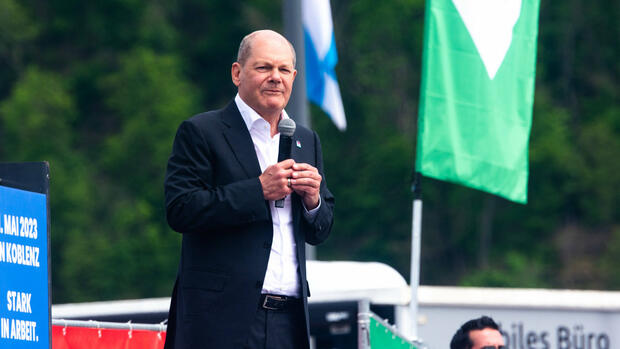During the election campaign, the chancellor made climate promises, but environmental groups have criticized him.
(Photo: IMAGO/NurPhoto)
Berlin Foreign Minister Annalena Baerbock (Greens) wants to make global progress in the expansion of solar and wind power, as she made clear on the first day of the Petersberg Climate Dialogue. But what does the Chancellor actually want? According to environmentalists, Olaf Scholz (SPD) would have the opportunity to emphasize Baerbock’s initiative with his speech at the conference this Wednesday.
Christoph Bals, Managing Director of the development and environmental organization Germanwatch, says: “It would be noticed internationally if the Federal Chancellor of the country that made the energy transition known around the world more than 20 years ago, were to advocate the resolution of an ambitious goal for a global energy transition .”
>> Read also: Baerbock calls for a global target for the expansion of renewables
According to Bals, the figures from the International Renewable Energy Organization should serve as a guide. According to their information, the renewables would have to be expanded by an average of 1000 gigawatts per year in the coming years – three times as much as today.
At the start of the two-day meeting in Berlin on Tuesday, Foreign Minister Annalena Baerbock (Greens) advocated negotiating a target for the global expansion of renewable energies.
Climate Chancellor or Anti-Climate Chancellor?
The Chancellor’s speech is scheduled for this Wednesday afternoon. During the election campaign, Scholz campaigned for himself as “Climate Chancellor”, that was a good two years ago. In the meantime, he is considered the “anti-climate chancellor”, at least by environmental protection associations such as the BUND. Most recently, he was accused of being willing to accept an undermining of the climate protection law that had been passed by the former grand coalition.
>> Read also: A minister is at the center of the climate dispute
It is not known what message the chancellor intends to announce on Wednesday. What is certain, however, is that he will once again stand up for his climate club idea in front of the representatives of around 40 participating countries.
Scholz had already made this plan his topic during his time as finance minister in the last legislative period and pushed it way up the agenda during the German G7 presidency last year as Federal Chancellor.
The G7 decided to set up a climate club, and other countries followed.
(Photo: dpa)
In essence, it is about uniting as many countries as possible, which agree on a common path to climate neutrality by 2050. The members should agree on a selection of climate policy instruments. Above all, this includes creating markets for climate-neutral products – such as green steel or green cement – and avoiding the relocation of industry due to CO2 costs, known in technical jargon as “carbon leakage”.
In December 2022, the heads of state and government of the G7 countries then adopted a climate club statute on Germany’s initiative, which forms the basis for further expansion. The Organization for Economic Cooperation and Development (OECD) and the International Energy Agency (IEA) have now set up a secretariat for the climate club.
The climate club is growing – but important states are missing
Government circles like to emphasize that the project is “extremely important” to the chancellor. The idea behind it is simple: countries with great ambitions to reduce greenhouse gas emissions join forces and take joint action to protect the climate. Ideally, your ambition will spread to other countries and regions, helping global climate protection to progress.
The climate club already seems to be having the desired effect: Chile, Argentina, Indonesia, Luxembourg, the Netherlands and Colombia have already become club members. Other countries, including Norway, the United Arab Emirates, Denmark and Uruguay, could soon follow.
In German government circles it is said that the group of members is “encouragingly diverse”. It is a positive signal that industrial, emerging and developing countries are equally interested in club membership. However, the world’s largest CO2 emitter is not a member and is not likely to become one any time soon: China suspended the climate dialogue with the USA last year and shows no interest in becoming a member of a club that the USA is the leading G7 state belong.
The climate club expressly does not want to be perceived as a competitor to the climate protection efforts under the umbrella of the UN, but as a supplement. For years, the process of the world climate conferences of the UN has been suffering from the fact that although new climate goals are constantly being created, individual states do not feel bound to actually achieve these goals. The climate club wants to resolve this contradiction.
More: The G7 climate club is well intentioned – but in the end it is no longer just symbolic politics
